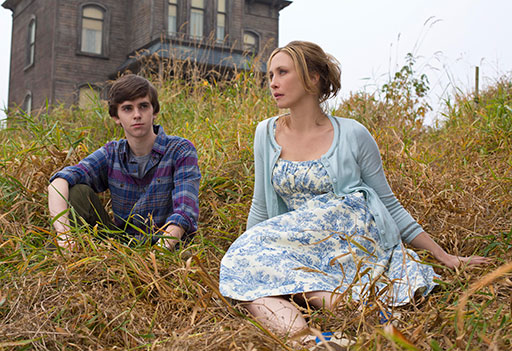Bates Motel on A&E premieres Monday, March 18, at 10pm ET. This modern-day prequel to Alfred Hitchcock’s genre-defining film Psycho comes from executive producers Carlton Cuse (Lost) and Kerry Ehrin (Friday Night Lights) and intends to give viewers an intimate portrayal of how Norman Bates’ psyche unravels through his teenage years. Fans will have access to Norman’s dark, twisted backstory and learn how deeply intricate his relationship with his mother Norma truly is. Stars Vera Farmiga (Up in the Air) and Freddie Highmore (August Rush).

By Kate O’Hare
In the 1960 Alfred Hitchcock thriller Psycho, embezzling secretary Marion Crane (Janet Leigh) is on her way from Phoenix to her boyfriend’s California home when a pounding rainstorm forces her to take shelter in the dilapidated Bates Motel, run by the apparently shy Norman Bates (Anthony Perkins).
Unfortunately for Marion, Norman suffers from a split personality, one a browbeaten son and the other the domineering mother he killed, who comes to life in her son and goes on a murderous rampage.
This month, A&E premieres Bates Motel, a 10-episode psychological thriller that delves into Norman’s past while also updating the story to the present day.
Executive produced by Carlton Cuse (Lost) and Kerry Ehrin (Friday Night Lights), it stars British actor Freddie Highmore (August Rush) as 17-year-old Norman Bates, and Vera Farmiga (Up in the Air) as his protective, widowed mother, Norma. Also starring are Max Thieriot, Mike Vogel, Nestor Carbonell, Olivia Cooke and Nicola Peltz.
RELATED: A&E’s Bates Motel is only the latest TV prequel
On a cold, relentlessly rainy December day an hour outside of Vancouver, cast and crew are working in a replica of the Bates Motel — iconic sign and all — and the looming Bates home on the hill behind it, up a flight of faux stone steps covered in mud and wet leaves.
Interestingly, wires and stakes hold up the spindly trees around the Bates home. A crew member explains that the site was a landfill, and the trees were planted to help stabilize the soil. Apparently, on a sunny day — as was the case when the scene of the Bates’ arrival was shot — there is a whiff of refuse in the air.
While the motel is fairly complete, the house is a roofless shell (adding a roof would force building codes to kick in), with only a bit of the interior actually created. (The home’s vaguely Victorian interiors are actually on a soundstage back in Vancouver.)
In the scenes being shot, Norman is trying to tease a small dog out from under the porch (unlike the cast and crew, Boomer the Wonder Dog seems perfectly happy to be running around in the wet and the mud), and then having an argument with his mother on the porch.
The scene with the dog reveals Highmore’s gift for facial expressions and physical comedy, as he reacts to the dog’s intransigence and then leaps out of the way as it suddenly bursts from its hiding place.
Later, in the confrontation scene, Farmiga ends by shouting Norman’s name and then stomping into the house, slamming the door behind her. After a few takes, her voices takes on an hysterical edge that is ironically funny, amusing British director S.J. Clarkson, who is so tightly packed into what looks like a snowmobile suit that she can barely move.
Highmore takes a break from filming in his blessedly warm and dry trailer to talk about playing a killer while he is still an innocent boy.
“Everybody knows who he’s going to become,” he says. “Even in these 10 episodes, you get to start seeing that change in him, from being someone who’s not very different from everybody else.
“That’s what I found, if you look at people who’ve gone slightly crazy and you think, at the start, wasn’t there something that set them apart? People would look back and say, ‘Oh, he was slightly different in this way or slightly quirky.’ The nice thing about Norman, at the start, you wouldn’t necessarily pick him out as the person who’s going to be in Psycho in however many years’ time.”
At the end of the shooting day, Farmiga huddles in a chilly room at the motel and defends Norma, saying, “She’s a mom, ruled by her love for her child, and sometimes, that love is … it’s difficult. She is leonine. She would fight wars for her child. Nothing means more to her than his happiness, and I see her as being valiant.
“First and foremost, it’s what I admire about her. It’s thwarted at times, because she loves him so much that it’s almost suffocating. It’s that very particular age that Norman’s at, that push and pull, that opposite of needing distance from your mother but yearning for that closeness.
“That dynamic, that opposite, is what’s so juicy.”



1 Trackback / Pingback
Comments are closed.